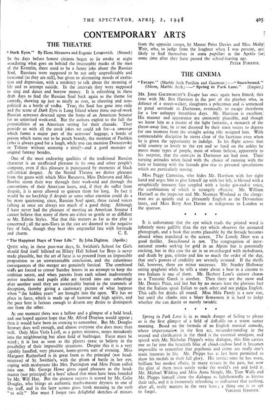" The Happiest Days of Your Life." By John Di g hton.
(Apollo.)
QurrE why, in these post-war days, St. Swithin's School for Girls should find itself billeted on Hilary Hall School for Boys is never Made plausible, but the art of farce is to proceed from an impossible proposition to an unwarrantable conclusion, and the calamitous consequences of this merger are genuinely farcical. The combined staffs are forced to censor Sunday letters in an attempt- to keep the coalition secret, and when parents from each school inadvertently arrive teachers and pupils alike are forced into one subterfuge after another until they are inextricably buried in the trammels of deception, thereby giving a cautionary picture of what happens when " the hidden years " are brought into the open. Wit has no place in farce, which is made up of humour and high spirits, and the pace here is furious enough to disarm any desire to distinguish one from the other.
At one moment there was a bellow and a glimpse of a bald head, and one hoped against hope that Mr. Alfred Drayton would appear ; then it would have been an evening to remember. But Mr. Douglas Stewart does well enough, and almost everyone else does more than well. Only Miss Viola Lyell, as a games mistress, strays mistakenly into the neighbouring but alien field of burlesque. Farce must be acted ; it is lost as soon as the players cease to believe in the possibility of their impossible situations. Despite this it is a very capably handled, very pleasant, home-grown sort of evening. Miss Margaret Rutherford is in great form as the principal (not head- mistress) of St. Swithin's, with the gleam of battle in her eye, coping with misfortune like Mrs. Partington and Miss Prism rolled into one. Mr. George Howe gives equal pleasure as the head- master (not principal) of a boys' school that must have been founded by Mr. Will Hay. But the greatest success is scored by Mr. Colin Douglas, who brings an authentic maths-master dryness to one of the staff, and in the later scenes gives fresh meaning to the verb " to wilt." Nor must I forget two delightful sketches. of minors
from the opposite camps, by Master Peter Davies and Miss Molly Weir, who, to judge from the laughter when I was present, are likely to find themselves in statu pupillari at the Apollo for some time after they have passed the 'school-leaving age.
PETER FORSTER,






























 Previous page
Previous page